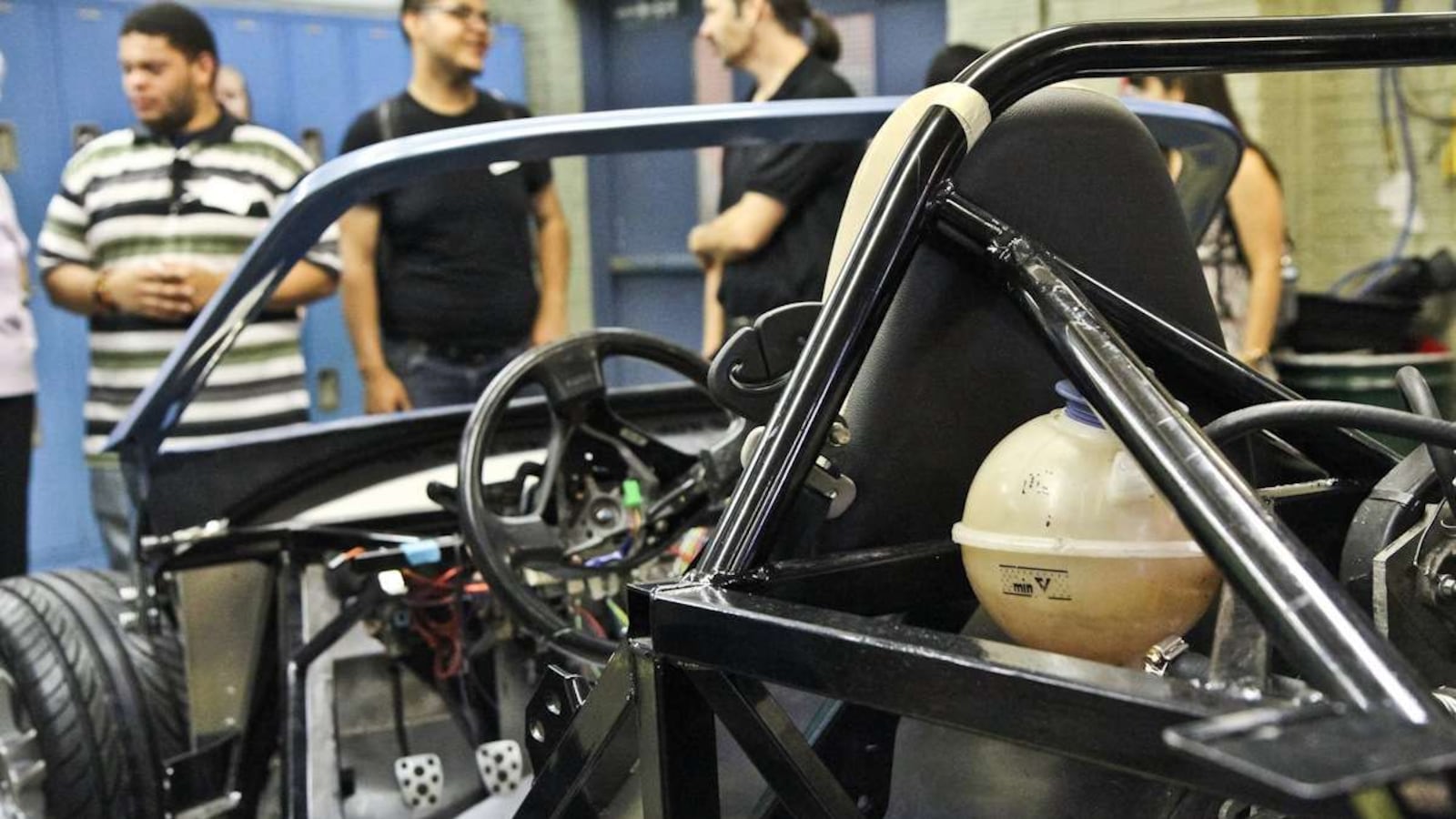This article was originally published in The Notebook. In August 2020, The Notebook became Chalkbeat Philadelphia.
Your browser does not support the audio element.
In the late 1990s, Matthew Riggan was becoming convinced that traditional teaching methods weren’t giving kids authentic opportunities to learn.
As the coordinator for West Philadelphia High School’s afterschool activities and adult learning, Riggan witnessed how the system was failing students all along the educational continuum.
He found he shared a vision with three of his colleagues – Simon Hauger, Michael Clapper, and C. Aiden Downey.
"We started talking about initially what was wrong with the way these high schools were working," he said, "feeling like something was missing. Gradually over time, the conversations kind of changed to what would the alternative look like."
Those talks spun the chrysalis of what eventually turned into a new public, non-selective admission school – the Workshop School. This week the school won honors from the White House.
Trust and freedom
The Workshop School, Riggan says, operates by one overarching principle:
"If you trust kids to do the work and to tackle really hard problems, they will constantly surprise and amaze you."
This was the Workshop School’s first year as a full-fledged, four-year high school. For the two previous years, it was a pilot program based in the Navy Yard for a handful of District 12th graders.
The pilot grew out of those early discussions and out of West Philly High’s award-winning alternative-energy automotive program – a wildly successful endeavor overseen by Hauger that was featured in a PBS Frontline documentary and earned praise from President Obama.
On Wednesday, students from the Workshop School were back at the White House at an event featuring science, technology, engineering, and mathematics to show off a biodiesel car they built that operates on used fryer oil and gets 100 miles per gallon.
Hubbub and collaboration
The school, which will grow to 160 kids next year, had only 90 students this year – most of whom were enrolled last year in West Philly High’s automotive division.
The Workshop School took over that program, attracted private philanthropy, and started changing students’ outlooks.
"I forgot all about last year because of this year. Let’s just put it like that," said Haziz Self, a Workshop School 12th grader.
Self loves the fact that the school is project-based.
"Once you start something, you’ve got to finish it," he said. "That’s a life lesson: Once you start something, you got to finish it."
Unlike traditional high schools, the Workshop School doesn’t divide its class periods by subject. Although students get traditional math and English in the afternoons, mornings consist of two 90-minute project blocks in which students learn a multitude of skills at once.
Teacher Frankie Bonilla said some of his students turned a classroom closet into a recording studio this year, then learned to compose and produce songs.
"When we built the studio, there was so much math involved," he said. "It was kind of like, ‘Put this wall up, this is how you do it.’ They made a lot of mistakes. So it was a lot of English. Some science and a lot of math."
Walking through the halls of the Workshop School, you can feel the hubbub of experimentation and collaboration.
One 9th grader connects the electrical system on a miniature solar panel. Another tweaks his design concept to make 52nd Street more pedestrian-friendly. A third shows off a visual representation of her poetry portfolio.
On the ground floor, students work together in three large automotive shops to design and build hybrid cars.
For Riggan, who now serves as the executive director of the school’s nonprofit wing, what really sets the Workshop School apart is its insistence that kids need freedom to learn from their mistakes.
"We give our students a lot of freedom and responsibility to sort of organize and carry out the work," he said. "There’s less emphasis on telling everybody exactly what they have to do all the time."
Riggan admits this approach carries with it a set of challenges.
"Because we don’t do a lot of the formal code-of-conduct, discipline, demerit type stuff," he explained, "it takes them a while to sort of figure out that it’s their job to live up to the values and standards that they have set for themselves."


